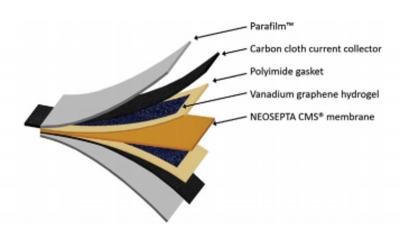
by MBF Admin | Oct 18, 2020 | 2D materials, Aerospace, AGM, Angstron Materials, Audio, Development, Graphene applications, Graphene Ink, Graphene Sensors, Investment, Products, Research, Supercapacitors
Researchers from the Daegu Gyeongbuk Institute of Science and Technology in South Korea have recently developed a low-cost energy storage device to power electronic devices like wearable skin sensors. The supercapacitor, made with graphene ink that is sprayed onto...
by MBF Admin | Jun 5, 2020 | 2D materials, Aerospace, AGM, Angstron Materials, Audio, Development, Graphene applications, Investment, Products, reduced graphene oxide, Research, Supercapacitors, Technical / Research
Researchers from the University of Houston and Texas A&M University have reported a structural supercapacitor electrode made from reduced graphene oxide and aramid nanofiber that is reportedly stronger and more versatile than conventional carbon-based...

by MBF Admin | May 24, 2020 | 2D materials, Aerospace, AGM, Angstron Materials, Audio, Development, Energy generation, Energy storage, Graphene applications, Graphene batteries, Investment, Products, Research, Supercapacitors, Technical / Research
Researchers at the Graphene Integrated Functional Technologies (GIFT) Research Cluster at Queen’s University in Canada have developed a novel graphene-based flexible hybrid battery–supercapacitor device.The device consists of high specific surface area...
by MBF Admin | May 5, 2020 | 2D materials, Aerospace, AGM, Angstron Materials, Audio, Development, Graphene applications, Graphene for Automotive, Graphene Oxide, Investment, Products, Research, Supercapacitors, Technical / Research
Researchers at Penn State and two universities in China have found that a new kind of supercapacitor, based on manganese oxide with cobalt manganese oxide as a positive electrode and a form of graphene oxide as a negative electrode, could combine the storage capacity...
by MBF Admin | Apr 14, 2020 | 2D materials, Aerospace, AGM, Angstron Materials, Audio, Development, Energy storage, Graphene applications, Investment, Products, Research, Supercapacitors, Technical / Research
A joint research team from Korea Institute of Energy Research (KIER), KAIST, Pusan National University (PNU) and NTU has developed a high-performance re-attachable sticker-type energy storage device. The team developed ‘re-attachable micro-supercapacitors (MSCs)...
by MBF Admin | Mar 18, 2020 | 2D materials, Aerospace, AGM, Angstron Materials, Audio, Development, Investment, Products, Research, Supercapacitors, Technical / Research
Researchers from the University College London designed new graphene-based supercapacitor materials that enable higher power density than current designs. The new materials also enables the production of bendable supercapacitors, without a liquid electrolyte which...



